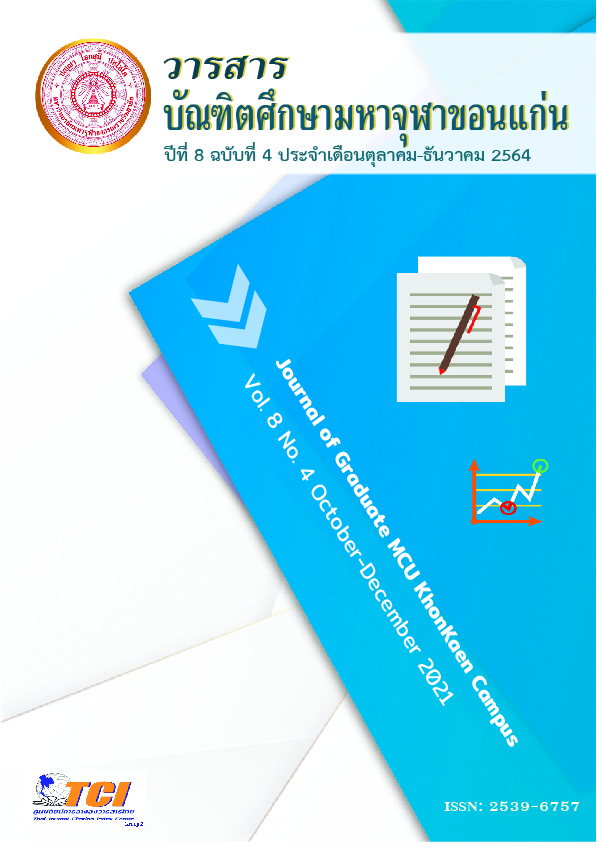การวิเคราะห์หลักจริยศาสตร์ในวรรณกรรมรามเกียรติ์
Main Article Content
บทคัดย่อ
งานวิจัยนี้มีวัตถุประสงค์เพื่อ 1) ศึกษาแนวคิดทฤษฎีทางจริยศาสตร์ 2) ศึกษาวรรณกรรมรามเกียรติ์ และ 3) ศึกษาวิเคราะห์หลักจริยศาสตร์ในวรรณกรรมรามเกียรติ์ เป็นวิจัยเชิงเอกสาร ศึกษาข้อมูลจากพระไตรปิฎก เอกสารวิชาการ และงานวิจัยที่เกี่ยวข้อง วิเคราะห์ข้อมูลด้วยการพรรณนาตามหลักอุปนัยวิธี
ผลการวิจัยพบว่า
1. แนวคิดและทฤษฎีทางหลักจริยศาสตร์ เป็นประพฤติปฏิบัติตามเพื่อให้เกิดความสุขความเจริญแก่ตนเองและสังคม เป็นแนวคิดที่กล่าวถึงหลักความจริงและเหตุการณ์ที่เกิดขึ้นตามหลักเหตุและผลที่พิสูจน์ข้อเท็จจริง หลักจริยศาสตร์มีลักษณะเป็นแนวทางในการประพฤติปฏิบัติที่มุ่งไปสู่จุดสูงสุดของชีวิต
2. เนื้อเรื่องที่มาของรามเกียรติ์ฉบับพระบาทสมเด็จพระพุทธยอดฟ้าจุฬาโลกมหาราชที่ได้รายละเอียดปลีกย่อยจากรามายณะฉบับฤๅษีวาลมีกิที่นำมาประกอบกันกลายเป็นรามเกียรติ์ของไทย และได้ปรับเปลี่ยนเนื้อหาให้สอดคล้องกับวัฒนธรรมของประเทศนั้นจนกลายเป็นวรรณคดีประจำชาติ เช่น ไทย ลาว พม่า กัมพูชา มาเลเซีย อินโดนีเซีย เป็นต้น
3. การวิเคราะห์หลักจริยศาสตร์ในวรรณกรรมรามเกียรติ์ พบว่า หลักการปฏิบัติด้านจริยธรรมทางศาสนา รามเกียรติ์เป็นวรรณกรรมทางศาสนาที่ถูกเขียนขึ้นมาเพื่อถ่ายทอดความรู้ ความเข้าใจในการนำเสนอให้ผู้อ่านได้เห็นความแตกต่างระหว่างตัวละครในเรื่องที่มีอยู่สองฝ่าย คือฝ่ายดีและฝ่ายชั่ว คือ 1) หลักจริยศาสตร์ที่มีต่อสังคม ด้านการปกครอง ได้แก่ ทศพิธราชธรรม, หลักพรหมวิหาร, จักรวรรดิวัตร 12, ความสามัคคี และสังคหวัตถุ 2) หลักจริยศาสตร์ที่มีต่อครอบครัว ได้แก่ หลักเบญจศีล, หลักความซื่อสัตย์ 3) หลักจริยศาสตร์ที่มีต่อตนเอง ได้แก่ อิทธิบาท
Article Details

อนุญาตภายใต้เงื่อนไข Creative Commons Attribution-NonCommercial-NoDerivatives 4.0 International License.
เอกสารอ้างอิง
กรุณา-เรืองอุไร กุศลาสัย. (2537). ภารตวิทยา. กรุงเทพมหานคร: สำนักพิมพ์ศยาม.
ทวีศักดิ์ ญาณประทีป. 2548. วรรณกรรมศาสนา. (พิมพ์ครั้งที่ 5). กรุงเทพมหานคร: สำนักพิมพ์รามคำแหง.
รัตนา คชนาท. (2547). รามเกียรติ์ ปฐมบทจุดกำเนิดแห่งสงคราม ความรักและความคับแค้น.กรุงเทพมหานคร: สำนักพิมพ์ ห้องเรียน บจก.
สมพร สิงโต. (2517). ความสัมพันธ์ระหว่างรามายณะของวาลมีกิและรามเกียรติ์พระราชนิพนธ์ในรัชกาลที่1. ใน วิทยานิพนธ์อักษรศาสตรมหาบัณฑิต. บัณฑิตวิทยาลัย: จุฬาลงกรณ์มหาวิทยาลัย.
อธิษฐ์ ทองอินทร์ และ ภานุพงศ์ยิ้มณรงค์. (2558). การศึกษาวิเคราะห์คุณธรรมด้านการปกครองในบทละครเรื่องรามเกียรติ์ พระราชนิพนธ์ในพระบาทสมเด็จพระพุทธยอดฟ้าจุฬาโลกมหาราช: กรณีศึกษาด้านสังคหวัตถุ 4. การประชุมวิชาการระดับชาติครั้งที่ 2. สถาบันและพัฒนา มหาวิทยาลัยราชภัฏกำแพงเพชร.
เอกฉัทร จารุเมธีชน. (2545). ลักษณะวรรณคดีสันสกฤตยุคพระเวท. (พิมพ์ครั้งที่ 3). ขอนแก่น: โรงพิมพ์พระธรรมขันต์.
Ramakian Home. (2562). รามเกียรติ์. สืบค้นเมื่อ 23 กรกฎาคม 2564, จาก http://www. Ramakian.Cjb.net.

